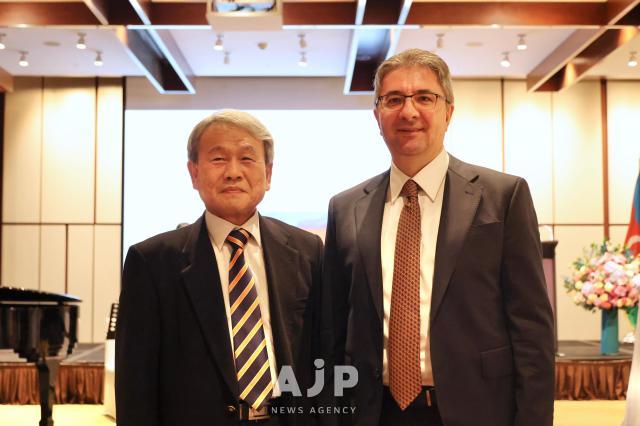
[This opinion article was contributed by Choe Chong-dae, a columnist and senior member of the Royal Asiatic Society Korea.]
SEOUL, November 25 (AJP) - Although geographically distant, Korea and Azerbaijan have come closer thanks to a series of meaningful events.
One such moment unfolded when the Embassy of the Republic of Azerbaijan in Seoul hosted a special ceremony on Nov. 6 to commemorate Victory Day, observed annually on Nov. 8. The event brought together dignitaries, foreign ambassadors, and prominent figures from Korea’s political, economic, scientific, media, and cultural spheres, as well as members of the Azerbaijani diaspora. It served not only to honor Azerbaijan’s military achievements but also to celebrate its enduring cultural heritage and expanding diplomatic presence on the global stage.
The commemoration highlighted two milestones: Azerbaijan’s 2020 victory in the 44-day Patriotic War and its rich cultural legacy. Under President Ilham Aliyev’s leadership, the victory resulted in the liberation of occupied territories, including Garabakh, enabling the return of hundreds of thousands of displaced citizens. Azerbaijan’s Ambassador to Korea, Ramin Hasanov, noted that the achievement represented not only the restoration of territorial integrity but also a triumph of justice and international law.
He emphasized that Azerbaijan remains firmly committed to peace. While the victory marked a historic turning point, the country continues constructive dialogue with Armenia to sign a peace treaty, which has recently been initialed, as well as to advance border delimitation efforts. Post-war priorities include large-scale demining, the reconstruction of Garabakh and Eastern Zangezur, and improving living conditions for returning residents.
Ambassador Hasanov also highlighted positive diplomatic developments following President Aliyev’s August 2025 visit to Washington, while acknowledging ongoing challenges such as humanitarian demining, the fate of missing persons, and safeguarding the rights of the Western Azerbaijani Community. He further praised the “Great Return Program,” through which more than 50,000 displaced citizens have already resettled in their homeland.
The ceremony featured a Victory Day documentary, a refined concert by Korean musicians, and a banquet, offering guests an opportunity to reflect on Azerbaijan’s resilience and the significance of the occasion.
At this moment of commemoration on November 6, news of a major diplomatic breakthrough further underscored Azerbaijan’s new chapter. I was heartened to learn that the leaders of Azerbaijan and Armenia had signed a historic accord at the White House on August 8, 2025, under the auspices of U.S. President Donald Trump. President Ilham Aliyev and Prime Minister Nikol Pashinyan shook hands as President Trump hailed the agreement as “historic,” noting that “it’s been a long time coming.” The accord is expected to reopen key transport routes between the two nations and strengthen U.S. engagement in the South Caucasus.
For more than three decades, Azerbaijan and Armenia had been divided by the tragic conflict over the former Nagorno-Karabakh region of Azerbaijan. The fierce battles of the late 1980s and 1990s left deep wounds on both sides. This new peace agreement now offers long-awaited hope for reconciliation and lasting peace in a region long burdened by division and sorrow.
Building on this renewed spirit of peace and cultural continuity, special presentations of Kitabi-Dada Gorgud—an ancient Azerbaijani epic and a monument of the Turkic world—were held at Seoul National University on Nov. 12 and at the National Assembly Members’ Office Building on Nov. 17. Supported by the Fund for Support to Azerbaijani Diaspora, the events introduced the Korean translation of six chapters of the epic, bringing together Korean dignitaries, members of the Azerbaijani diaspora, and students.
With 1,000 copies donated to libraries nationwide, the Korean edition underscores the deepening cultural ties between Azerbaijan and Korea. Jointly translated by Azerbaijani and Korean scholars, it contributes meaningfully to promoting Azerbaijan’s heritage and strengthening mutual understanding.
Believed to have been composed between the 9th and 11th centuries from ancient oral traditions, Kitabi-Dada Gorgudis a foundational spiritual monument of the Turkic world, celebrating heroism, homeland, and the triumph of good over evil. Today, it is regarded as a vivid reflection of the lifestyle, values, and heroic spirit of the ancestors of the Azerbaijani people and an essential component of the cultural heritage of the Turkic world.
Its influence continued through Nizami Ganjavi (1141–1209), Azerbaijan’s legendary poet and writer, whose five-part masterpiece Khamsa enriched world literature with universal themes of love, justice, and wisdom. Together, these works reflect Azerbaijan’s dual heritage—its heroic Turkic traditions and its profound classical humanism—and continue to resonate in modern cultural exchanges, especially with Korea.
Between 2009 and 2011, joint archaeological excavations in Gabala uncovered artifacts strikingly similar to those in Gyeongju, Korea’s ancient Silla capital, suggesting early Silk Road contacts. These discoveries inspired the 2015 sister-city partnership between Gabala and Gyeongju. Nizami’s Leyli and Majnun, recently translated into Korean, has also become an enduring cultural bridge, deepening mutual understanding between the two nations.
Ultimately, Azerbaijan’s Victory Day celebration in Seoul—combined with the recent peace accord in Washington—symbolizes a nation moving from conflict to cooperation, and from resilience to renewal. Today, Azerbaijan stands as a confident, forward-looking country: rebuilding its land, engaging the world through diplomacy, and honoring its deep historical roots as it enters a new era of peace and global leadership.
Moreover, the Korean translation of Kitabi-Dada Gorgud—an ancient Azerbaijani epic and monument of the Turkic world—showcases Azerbaijan’s rich heritage while strengthening cultural ties between Korea and Azerbaijan.
--About the author--
The author, Choe Chong-dae, is a columnist and senior member of the Royal Asiatic Society Korea. He is also an international cultural and historical affairs enthusiast. He has contributed regular opinion columns to The Korea Times for over four decades. He is an editorial board member of the Newsletter of the Korea-America Association and the founding director of the Korea-Swedish Association. In 2010, he was awarded Sweden's Royal Order of the Polar Star, one of the country's most prestigious honours.
Copyright ⓒ Aju Press All rights reserved.


